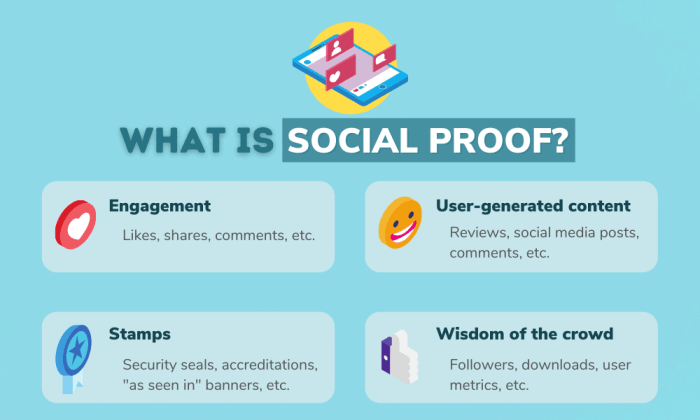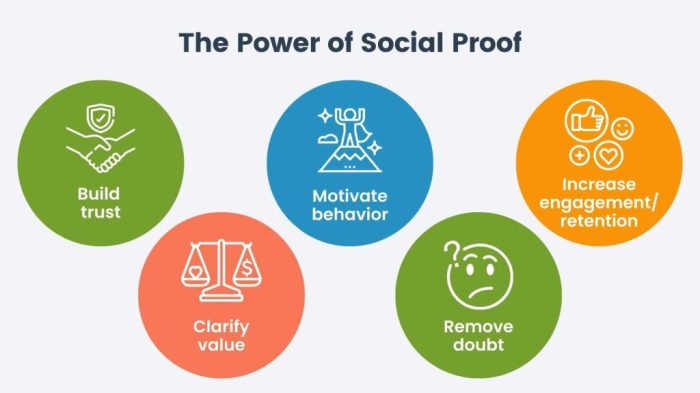Social Proof Strategies sets the stage for this enthralling narrative, offering readers a glimpse into a story that is rich in detail with american high school hip style and brimming with originality from the outset.
In today’s digital age, leveraging social proof has become a crucial aspect of marketing strategies to gain credibility and influence consumer behavior. From testimonials to influencer endorsements, businesses are utilizing various forms of social proof to build trust and drive conversions. Let’s dive into the world of social proof strategies and explore how they can revolutionize your marketing efforts.
Social Proof Strategies

Social proof in marketing is the phenomenon where people tend to follow the actions of others when making decisions. It is based on the idea that if others are doing something, it must be the right thing to do. Businesses use social proof strategies to influence consumer behavior by showing evidence of others using and enjoying their products or services.
Examples of Businesses Using Social Proof Strategies
- Amazon displays customer reviews and ratings on product pages to show potential buyers the popularity and quality of the products.
- McDonald’s uses phrases like “Over 1 Billion Served” on their signs to demonstrate the widespread popularity of their fast food.
- Booking.com shows how many people are currently viewing a hotel or how many rooms are left to create a sense of urgency and scarcity.
Psychological Principles Behind Social Proof
Social proof is effective in influencing behavior because it taps into the human need for social validation and conformity. When individuals see others engaging in a particular behavior, they are more likely to follow suit to fit in or make the “right” choice. This principle is rooted in the idea that people look to others for cues on how to behave in uncertain or ambiguous situations.
Types of Social Proof

In the world of marketing, social proof plays a crucial role in building trust and credibility with potential customers. There are several types of social proof that businesses can utilize to showcase the positive experiences of their clients and customers.
Testimonials
Testimonials are written or spoken statements from satisfied customers who have used a product or service. They are often displayed on a company’s website or marketing materials to showcase real-life success stories. Testimonials can be powerful in building trust and credibility with potential customers, as they provide social proof of a product or service’s effectiveness.
Reviews
Reviews are feedback and ratings left by customers on platforms like Google, Yelp, or Amazon. Positive reviews can significantly impact a consumer’s purchasing decision, as they provide insight into the quality of a product or service from real customers. Businesses can leverage positive reviews in their marketing campaigns to showcase the positive experiences of their customers.
Case Studies
Case studies are in-depth analyses of how a product or service helped a specific customer achieve their goals. They provide detailed information on the problem, solution, and results of using a particular product or service. Case studies are effective in showcasing real-life success stories and demonstrating the tangible benefits of a product or service.
Social Media Validation
Social media validation refers to the likes, shares, and comments that a business receives on platforms like Facebook, Instagram, or Twitter. When customers engage with a business’s social media content positively, it serves as social proof of the brand’s credibility and popularity. Businesses can leverage social media validation in their marketing campaigns to showcase their engaged audience and positive brand reputation.
Implementing Social Proof Strategies
When it comes to integrating social proof into a website or e-commerce platform, there are a few key steps to follow to ensure its effectiveness. By collecting and showcasing customer testimonials and leveraging influencer endorsements, you can build trust with your audience and drive conversions.
Integrating Social Proof
One of the first steps in implementing social proof is to display real-time notifications of recent purchases or sign-ups on your website. This creates a sense of urgency and shows that others are actively engaging with your brand.
- Utilize customer reviews and ratings prominently on product pages to showcase the positive experiences of previous buyers.
- Include trust badges and certifications to reassure visitors of your credibility and security measures.
- Incorporate social media feeds or user-generated content to highlight authentic interactions with your brand.
Collecting and Showcasing Testimonials
Effective customer testimonials can significantly impact purchasing decisions. To collect and showcase testimonials successfully:
- Reach out to satisfied customers directly for feedback and permission to use their testimonials.
- Showcase testimonials in various formats, such as text, video, or audio, to cater to different preferences.
- Include specific details and results in testimonials to make them more compelling and relatable to potential customers.
Leveraging Influencer Endorsements, Social Proof Strategies
Influencer endorsements can provide a powerful form of social proof, especially when targeting specific audiences. To leverage influencer endorsements effectively:
- Identify influencers whose values align with your brand and whose followers match your target demographic.
- Collaborate with influencers on sponsored content or product placements that authentically showcase your brand.
- Encourage influencers to share their genuine experiences with your products or services to build credibility and trust.
Measuring the Impact of Social Proof: Social Proof Strategies
When it comes to measuring the impact of social proof on your business, there are key metrics you should track to evaluate the effectiveness of your strategies.
Key Metrics to Track
- Conversion Rates: Monitor how social proof influences the percentage of website visitors who take a desired action, such as making a purchase or signing up for a newsletter.
- Engagement Metrics: Look at metrics like likes, shares, comments, and overall engagement on social media platforms to gauge the impact of social proof content.
- Customer Retention: Measure the rate at which customers return to make repeat purchases after being exposed to social proof.
Tools and Methods for Monitoring
- Google Analytics: Utilize this tool to track website traffic, conversion rates, and user behavior to understand how social proof affects your online presence.
- Social Media Insights: Use built-in analytics tools on platforms like Facebook, Instagram, and Twitter to analyze the performance of social proof content.
- Surveys and Feedback: Collect feedback from customers to understand how social proof influences their purchasing decisions and overall perception of your brand.
Case Studies and Examples
One example of a business successfully measuring the impact of social proof is a clothing brand that saw a 20% increase in online sales after implementing customer testimonials on their product pages. By tracking conversion rates before and after the implementation, they were able to attribute the growth directly to social proof.





